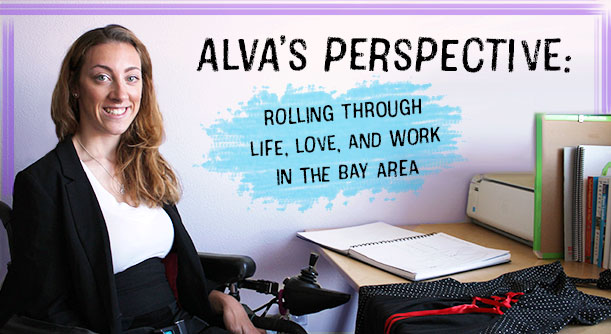Gainful Employment: Make A Living By Making Your Job Work For You
June 17th, 2014
by Alva
Unfortunately in today’s society, there is an overwhelming assumption that people with disabilities cannot, will not, and in fact should not, hold down regular jobs. Whether it is because of an assumed “stupidity” or complete physical limitations (or both), society tells people with disabilities not to even aspire to be employed, contributing members of society. This message gets perpetuated from (some) generation(s) to generation(s), (some) employer(s) to employer(s), and indeed, by (some) people with disabilities themselves. People with disabilities thus come to expect less out of life and from themselves and can forget that a lack of visual self-representation in the workplace does not mean they should not strive for employment.
Due to this seeming absence of employees with disabilities, people applying for jobs may be nervous and apprehensive as to how and if to mention their disability in a cover letter or application. It is my opinion that this depends on the company and job you are applying to. For example, for the majority of the jobs that I have applied to and have gotten, my disability itself and/or the experience and skills I have acquired by having a disability have been positive attributes. Thus, I was not shy about openly discussing my disability and how it would affect, both positively and negatively, my job performance. The job I currently have, however, is the first job I have applied for that was not with a disability-related organization. While I still mentioned my disability in my cover letter, resume, and throughout the entire interview, I had to consider the way in which I did so and how to reassuringly highlight is as a positive.
Between the time that you submit an application and learn whether or not you get an interview, take time to study the job description and company mission to preemptively identify some potential areas where your disability could affect your ability to do a job efficiently. Then think of some creative problem solving ideas of ways you would take care of them without the involvement of another employee or boss. Also come up with examples of ways you have modified past tasks or projects to have on hand during your interview to put your interviewer at ease about your ability to competently do the job. In my most recent interview and now at my job I talked about how, as a receptionist, a large portion of the job is answering phones and I, as someone with a speech impediment, can be rather difficult to understand over the phone. During my interview, I addressed this “issue” and reassured my interviewer that I was not only aware of this difficulty but made a conscious effort to over-annunciate when answering the phone. I mentioned that I could also recognize when the person on the phone was not going to understand me (regardless of my annunciation) and was comfortable handing the call off to someone else.
Having ready answers and examples for interview questions will do little good if, throughout the whole interview, your disability “acts up,” giving away how nervous you are. One thing that I had to “get over” when preparing for an interview (or even an important meeting after I’ve landed the job) was the feeling that there was only one way to dress professionally. It has been my experience, too, that most typically-business-appropriate clothes are not warm… at all! And when I get cold, cement blocks could not hold down my spastic limbs. I was so relieved, and frankly empowered, when I discovered ways to dress that were not only professional, but comfortable and warm, ensuring my ability to present my “best self” to potential employers. Business slacks instead of a pencil skirt, boots that allow me to wear warm socks instead of stiletto pumps, and a cardigan underneath a suit jacket allow me to not only look professional, but stay warm, calm, and comfortable.
The last piece of advice I have for becoming employed (as someone who is by no means an expert, and is very much still learning) is to remember that you are likely the first and only person with a physical disability your interviewer has ever interviewed. It is also likely that you are the first person with a physical disability to enter a particular workplace. Therefore, it is crucial to not only be open-minded, but patient with co-workers and superiors (as well as interviewers) in terms of discussing your disability. In most of my interviews, I actually ask if they have ever hired someone with a physical disability before. I am not judgmental or short with them, and I allow them time in the interview to ask me questions and tell me concerns that they might have regarding my hire. This gives me the opportunity to put their concerns to rest and assure them that, despite any accommodations or “extra work” hiring me might require, I would be a valuable employee that brings something special to their company.
That is the take-away message I want you to get from this article: Despite any accommodations or “extra work” that might come from hiring you, you (as a person with a disability) are a valid candidate for jobs and are a valuable employee who brings unique attributes to any workplace. The truth of the matter is, you are going to encounter a lot of people and employers who do not think you can do certain jobs. It is hard enough convincing them otherwise when you yourself also believe in this inability. Acknowledge your limitations, come up with creative ways to compensate for them, and be willing to have realistic conversations about your disability and the potential job at hand.



Leave a Comment